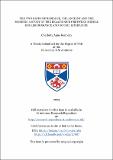The two kinds of romance, the ancient and the modern : a study of the relationship between Middle English romance and Gothic literature
Abstract
The Gothic genre developed alongside the eighteenth- and nineteenth-century antiquarian project to discover, collect and publish Middle English romances, but what exactly is the nature of the relationship between the Gothic novel and these medieval texts? This thesis identifies Gothic texts that respond to Middle English romance, demonstrating that this response is often characterised by concerns about the nature of history and the potential for that history to be appropriated to promote contemporary political, historical and antiquarian narratives. In these works, engagement with Middle English romance involves processes of rewriting, reinventing and refashioning to project contemporary discourses onto the medieval past. First examining the use of imagined manuscripts in Gothic literature to establish the relationship between Gothic literature and the contemporary antiquarian context, the thesis then looks at Clara Reeve’s place in this context, demonstrating that her knowledge of Middle English romances was limited by a lack of access to manuscript sources at a time when few of these texts were in print. By contrast, James White had considerable knowledge of medieval literature and used this to challenge and mock contemporary approaches to the study of history in his parodic novel Earl Strongbow (1789). James Hogg similarly uses Middle English romance in his criticism of contemporary antiquarian practices in The Three Perils of Man (1822), subverting the romance of The Marriage of Sir Gawain to reject antiquarian attempts to stabilise the narrative as a relic of ancient history rather than a living, evolving part of folklore. Where Hogg stages a clash between oral and written narratives, the texts in the final chapter of this thesis respond to an existing conflict between werewolf narratives in folklore and romance, exhibiting an anxiety about the instability of a werewolf myth which would eventually crystallize into a distinctly Gothic form.
Type
Thesis, PhD Doctor of Philosophy
Collections
Items in the St Andrews Research Repository are protected by copyright, with all rights reserved, unless otherwise indicated.

